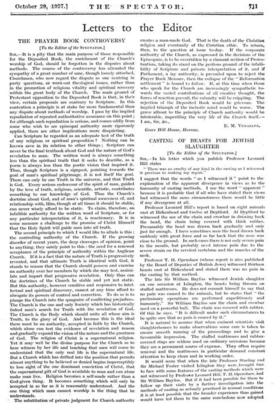Letters to the Editor
THE PRAYER BOOK CONTROVERSY [To the Editor of the SPECTATOR.] Sin,—It is .a pity that the main purpose of those responsible for the Deposited Book, the enrichment of the Church's
worship of God, should be forgotten in the disputes about methods. The course of the controversy has alienated the sympathy of a great number of sane, though loosely attached, Churchmen, who now regard the dispute as one centring in party questions, or worn-out theological issues, rather than in the promotion of religious vitality and spiritual recovery within the great body of the Church. The main ground of Protestant opposition to the Deposited Book is that, in their view, certain proposals are contrary to Scripture. In this contention a principle is at stake far more fundamental than
any-dispute about methods of worship. I pass by the implied repudiation of repeated authoritative assurance on this point ;
for although such repudiation is serious, and comes oddly from some who wish to see episcopal authority more rigorously applied, there are other implications more disquieting.
Can Scripture be regarded as an adequate test of the truth of any religious or spiritual proposition ? Nothing can be known save in its relation to other things ; Scripture can never be the final textbook about God and the nature of God's revelation to man. The written word is always something less than the spiritual truth that it seeks to describe, as a poem is always less than the poetic vision that inspired it. Thus, though Scripture is a signpost, pointing towards the goal of man's spiritual pilgrimage, it is not itself the goal. There can only be one Truth in the universe, and that Truth is God. Every serious endeavour of the spirit of man, guided by the love of truth, religious, scientific, artistic, contributes something to our knowledge of God. Thus the Church's doctrine about God, and of man's spiritual awareness of, and relationship with, Him, though at all times it should be stable, can never wisely afford to be static. To claim, therefore, an infallible authority for the written word of Scripture, or for any particular interpretation of it, is reactionary. It is in some measure a challenge to the promise of Christ Himself that the Holy Spirit will guide men into all truth.
The second principle to which I would like to allude is this : the controlling authority of the Church. If the growing disorder of recent years, the deep cleavages of opinion, point to anything, they surely point to this : the need for a renewed acceptance of the principle of authority within the Anglican Church. If it is a fact that the nature of Truth is progressively revealed, and that ultimate. Truth is identical with God, it stands to reason that the Church should possess and exercise an authority over her members by which she may test, assimi- late and impart that progressive revelation. Only thus can the doctrines of the Church be stable and yet not static. But this authority, however sensitive and responsive to intel- lectual and spiritual discovery, cannot at any time afford to abrogate its powers of control and correction. To do so is to plunge the Church into the quagmire of conflicting prejudices. The Church' is the one and only Society which has historically linked man's search for Truth with the revelation of God. The Church is the Body which should unite all whose aim is Truth, to the glory of God. And because this is the ideal there must be an authority, accepted in faith by the Church, which alone can test the evidence of revelation and reason and gradually expand the vision of the nature and the greatness of God. The religion of Christ is a supernatural religion. Yet it may well be the divine purpose for the Church so to bear witness by her life and teaching that men will come to understind that the only real life is the supernatural life. -But a Church which has drifted into the position that permits almost anything to be believed or denied begins imperceptibly to lose sight of the one dominant conviction of Christ, that the supernatural gift of God is available to man and can alone make man live. Religion becoriies a self-made rather than a God-given thing. It becomes something which will only be accepted hi so far as it is reasonably understood. And the one thing which man cannot worship is the thing that he understands. '
The substitution of private judgment for Church authority creates a man-made God. That is the death of the Christian religion and eventually of the Christian ethic. To return, then, to the question at issue to-day. If the corporate authority of the Church, as expressed in the decisions of the Episcopate, is to be overridden by a clamant section of Protes- tantism, taking its stand on the perilous ground of the infalli- bility of Scripture and private interpretation of it, and if Parliament, a lay authority, is prevailed upon to reject the Prayer Book Measure, then the collapse of the " Reformation settlement " is bound to follow. If, at this time when those who speak for the Church are increasingly sympathetic to- wards the varied contributions of all creative thought, the forces of reaction prevail, the calamity will be crippling. The rejection of the Deposited Book would be grievous. The implied triumph of the inelastic mind would be worse. The grave affront to • the principle of Church authority would be intolerable, imperilling the very life of the Church itself.-- I am, Sir, &c.,
E. M. 'ENABLES.
Grove Hill House, Harrow.


























































 Previous page
Previous page